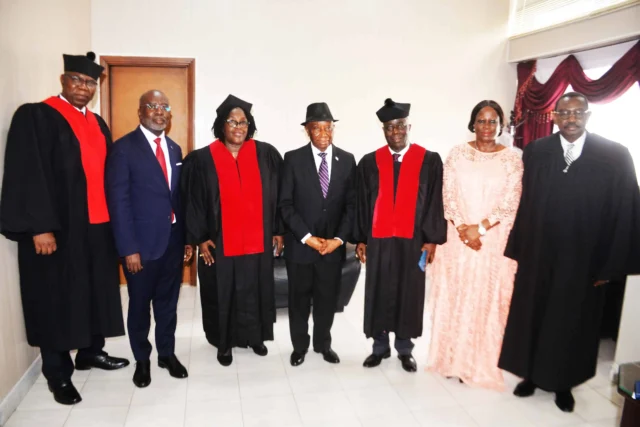
Liberia’s government has three branches of government: legislative, executive, and judicial, each with separate powers. The constitution ensures separation of powers and checks and balances, preventing individuals from exercising any powers in other branches.
Chapter VII of the Liberian Constitution outlines the judiciary branch’s powers, which are vested in the Supreme Court and subordinate courts established by the Legislature. Criminal and Assizes Courts, Circuit Courts, Debt Courts, Monthly and Probate Courts, Tax Courts, Revenue Courts, Commercial Courts, National Labor Courts, Traffic Courts, Juvenile Courts, and Magistrate Courts.
The Supreme Court, headed by the Chief Justice, is the head of the Judiciary Branch in the Republic of Liberia. It comprises a 5-member bench, including a Chief Justice and four Associate Justices. If a quorum isn’t obtained, the president appoints an Ad Hoc Justice from Circuit circuit judges, considering seniority.
The President appoints a Chief Justice and four Associate Justices of the Supreme Court, with three forming a quorum.
They hold office during good behavior. To occupy seats of honor, they must be ceremonially seated during a ceremony, allowing participation in court deliberations. The Supreme Court is the highest in the land, with its judgments being mandatory and binding, and its members are prohibited from engaging in personal businesses outside the court.
The Supreme Court has objected to the proposed $17 million and $3 million contingency amounts, constituting 2.8% of the 2024 national budget, allocated to the Judiciary Branch of Government. The proposed budget allocation raises concerns about the necessary resources for the judiciary to function effectively.
The Judiciary has expressed concerns about the current budget’s insufficiency, stating it could hinder its ability to ensure fair, efficient, and timely justice delivery.
A claim about the cut of the judiciary budget is also found here and here. The Liberian Supreme Court position is supported by the Liberian National Bar Association, an independent, ethical, and improved judiciary and legal education system established in 1907. Its mission is to promote access to justice, uphold legal and professional ethics, and foster fraternal bonds.
Finding:
We checked the published 2023 and 2024 fiscal budgets to verify the Supreme Court’s claim of budget cuts. The judiciary budget was cut by 4.8%, which is 892,030 down from the 2023 fiscal budget.
Section 21.3 of the 2006 judiciary law, titled the Financial Autonomy Act, allows all estimates to be included in national budget estimates without revision, subject to budget bureau recommendations
The provision aligns with Article 72 (a) of Liberia’s constitution, which outlines the remuneration of Supreme Court justices and judges of subordinate courts.
Chief Justice:
Justice Yuoh, head of the judiciary, has said the Supreme Court submitted a budget estimate of $31 million to the Ministry of Finance and Development Planning, but the Ministry of Finance rejected it, instead submitting a different estimate of US$17 million for the judiciary. The legislature allocated $3 million as a one-time, non-recurrent appropriation for judges’ benefits upon budget passage.
She said the cut was brought to the attention of the president, who convened a meeting amongst the three branches of the government on June 23, 2024, to address the budgetary issue of the judiciary.
At the end of the meetings, the chief justice claimed the president mandated an upward review of the judiciary budget, agreed upon by the legislature, and committed to having the ways and means, finance and budget committee meet with the judiciary technical team.
“It has been far over five weeks since that meeting and no one from either the Ministry of Finance or the relevant committees of the legislature has followed with the judiciary as was agreed upon by all present at those meetings,” said Justice Yuoh.
The Supreme Court expressed disappointment and dismay in a letter to the president, stating that the situation contradicts the spirit of the tripartite meeting held on June 23, 2024.
Cllr. Abraham Sillah said there are three separate but coordinated branches of government, with each assigned specific constitutional powers, functions, and responsibilities.
“The legislature has the constitutional power to make and unmake laws. The national budget is a law. The legislature can make and unmake the budget law to affect the budgetary allocation of any of the 3 branches of government, including the judicial branch.”
Conclusion: Correct, the 2024 judiciary budget was cut by 4% from the previous year’s budget (2023).




